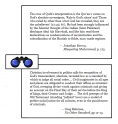Juxtaposition: Qutb & Bahnsen
[ by Charles Cameron — edited version, see final para ]
.
I’ve said before that juxtaposition does not imply eqivalence. It does, however, provide a striking means of raising questions, pointing up similarities where differences are also present and differences where similarities may be more easily discerned — questioning easy assumptions, in other words.
In this juxtaposition, I want to make it clear that a small subset of Christians (Dominionists or Theonomists, here exemplified by Greg Bahnsen, lower panel) like a highly visible subset of Muslims (Islamists, represented here by Sayyed Qutb) seek the universal imposition of what they believe to be God’s law.
It is worth noting, btw, that Gregory Bahnsen was a postmillennialist, which is to say he expected, to quote Wikipedia, that “increasing gospel success will gradually produce a time in history prior to Christ’s return in which faith, righteousness, peace, and prosperity will prevail in the affairs of men and of nations.” The dominionist / theonomist movement in which he partakes, in other words, is one which is busy making the world ready for Christ, not expecting him at any moment before that work is done.
Please note, also, that this juxtaposition does not mean that Christian and Islamic apocalyptic movements divine law movements are “the same” —
**
I have now edited this post in light of Joel Richardson’s comment below, and removed the second half of my original post, in which I’d invited Joel to comment, which will shortly to be found in edited and revised form at Juxtaposition: Christian and Islamic apocalypticisms.

Charles Cameron:
January 25th, 2016 at 4:02 am
I’d asked Joel Richardson to comment if he wished, and he did so in response to the same invitation on twitter:
Joel is entirely right – my phrase “Christian and Islamic apocalyptic movements” doesn’t cover either Bahnsen (whom I’d correctly identified as postmillennialist) or Qutb (similarly, Islamist), as it happens, and in similar ways. I should have written “divine law movements” – and have amended my text above accordingly.
.
Joel’s own phrase “not apocalyptic however, but political” isn’t quite right either, however, since Theonomy and Islamism are (both) religiously inspired movements that address political / legal issues from scriptural and theological bases.
.
I appreciate his correction, and the opportunity it has given me to reconsider both Bahnsen and Qutb in its light.
.
To clarify things further, I am removing the second half of this post, which did concern apocalyptic movements, and will make a separate post of it.
Grurray:
January 25th, 2016 at 3:47 pm
This might be of some interest:
https://www.youtube.com/watch?v=KU9k2OvfVvY
Do Muslims & Christians worship the same God? Nabeel Qureshi was born Muslim and converted to Christianity and is getting his DPhil at Oxford. Volf is a professor at Yale Divinity School and a leading Christian Islamist.
Charles Cameron:
January 25th, 2016 at 6:27 pm
Thanks, Grurray, I very much appreciate the pointer:
.
I have been following this issue, and Dr Volf particularly, since the Weaton business first broke — interestingly, he gave a lecture on the topic himself at Wheaton which I highly recommend.
.
My own take, if I may, is that it is the same God who listens to all prayer, but different ideas about God that are held by each and every one of us who prays. The question, “Do Muslims & Christians worship the same God?” seeems to me too focused on Christians and Muslims, and not enough on God.
.
But then, I’m ornery, as I’m sure you’re aware : )
larrydunbar:
January 26th, 2016 at 7:47 pm
When the question, “Do Muslims and Christians worship the same God? is asked, in the little I know (and it is very very little) about religions, I expected the name Abraham to come up. I mean, there does seem to be a similar thread of logic that is common to Jews, Christians, and Muslims that comes up in this type of question, and that logic also seems to be link back to Abraham. So when seeking common ground or a common God, finding a point that is common to all three movements may be helpful in understanding their positions. Or do you think the point is no longer relevant in today’s globalized world, because, in the context of a monolithic religion, new Christ-based Books written are no longer on point, or are they? The point being, if they all are on point, then there might be only one God, in that single context.
Grurray:
January 26th, 2016 at 10:21 pm
Abraham is both common ground and where the divisions start.
In Genesis ch 18 three men visited Abraham. Most Christians believe it was the Holy Trinity. Abraham ate cake and tender calf with them.
The same scene played out in Quran ch 51. Muslims believe they were angels, and they don’t have any food because angels don’t need to eat.
There are other instances where we believe in the same archetypes, just different details, such as with archangels like Gabriel and Michael. Also saints/heroes like the Green Knight https://en.wikipedia.org/wiki/Khidr
larrydunbar:
January 27th, 2016 at 12:02 am
“Abraham is both common ground and where the divisions start.”
*
I can understand how divisions start, through explicit “details”. Most people believe it is in explicit details that truth never changes. I think Zen and I got into a conversation over just that point, over 10-years ago. Much like the difference between Shia and Sunni, it was never really resolved. 🙂
*
If the details came together like an hourglass, before and after Abraham, what details brought them together?
*
Just a guess, was it an implicit law or ruleset?
Grurray:
January 27th, 2016 at 1:32 pm
At the Bauhaus they had a saying, ‘God is in the details’